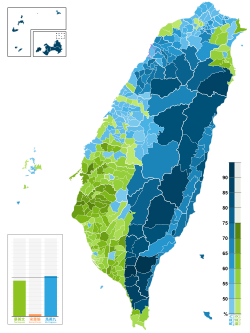Taiwanese presidential election, 2012
|
|
|||||||||||||||||||||||||||||
|---|---|---|---|---|---|---|---|---|---|---|---|---|---|---|---|---|---|---|---|---|---|---|---|---|---|---|---|---|---|
|
|||||||||||||||||||||||||||||
| Turnout | 74.38% | ||||||||||||||||||||||||||||
|
|||||||||||||||||||||||||||||

Leaders in township-level units:
Ma-Wu Ticket
Tsai-Su Ticket
|
|||||||||||||||||||||||||||||
|
|||||||||||||||||||||||||||||
| Taiwan presidential election, 2012 | |||
| Traditional Chinese | 中華民國第十三任總統、副總統選舉 | ||
|---|---|---|---|
|
|||
| Transcriptions |
|---|
The election for the 13th-term President and Vice-President of the Republic of China was held in Taiwan on 14 January 2012. The election was held concurrently with legislative elections. It was the fifth direct election for the President of the Republic of China. Prior to 1996, the President was elected by the ROC's National Assembly and not directly by the people.
Incumbent Ma Ying-jeou was re-elected as President with 51.6% of the vote. DPP challenger Tsai Ing-wen resigned her post as chairperson of the DPP following her election defeat.
The Kuomintang (KMT or Chinese Nationalist Party) ticket won a landslide victory in 2008 over the incumbent Democratic Progressive Party, with a 2.2 million vote margin on 58% of the valid votes.
The administration of Ma Ying-jeou has been friendlier in policy towards the People's Republic of China and also signed the Economic Cooperation Framework Agreement (ECFA), a preferential trade agreement between the governments of the PRC and the ROC.
The Democratic Progressive Party was hit hard with former president Chen Shui-bian's corruption revelations, but new chairwoman Tsai Ing-wen rebuilt the party, leading to a series of victories in legislative by-elections and local elections.
One big election topic appears to be the "1992 consensus", a term describing the declared outcome of a meeting in 1992 between the semi-official representatives of mainland China and Taiwan. The KMT agrees that this consensus should be the basis for negotiations with the PRC and supports it during the election, while the DPP believes that no such consensus was reached and that as a policy it is equivalent to the One-China principle, which the DPP opposes. Instead, the DPP has advocated that a "Taiwan consensus" be produced in a democratic way, by the legislature and a referendum of the people of Taiwan.
...
Wikipedia



